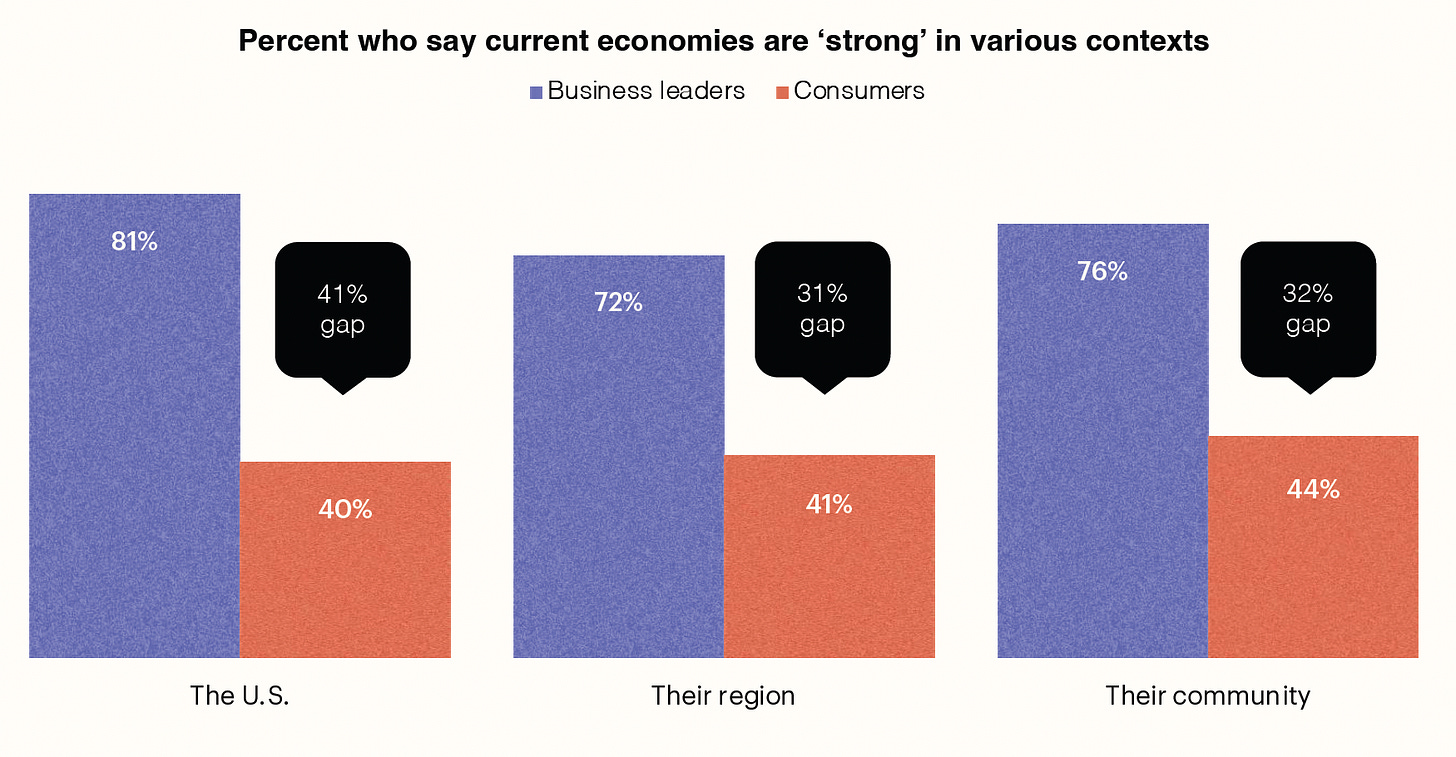The Milken Institute '24: Stark Divides & Surprising Consensus
Part 1: Despite deep divides, our research targets unity beyond this election cycle.
Greetings from Los Angeles, where the Milken Institute Global Conference 2024, #MIGC24 just wrapped. Yesterday marked the launch of our latest endeavor, the Milken Institute-Harris Poll Listening Project report, titled "Building A Resilient America: The New Consensus for Action." For half a decade, this project has posed a simple question to business leaders and the public: What solutions, if implemented, could profoundly impact people's lives, their communities, and our collective societies? This year, we zero in on America's future post-election outcomes — seeking fertile ground for consensus and hope.
Below are images from the Geo-Economic Panel
The Challenge: Divided Realities
Our findings reveal a staggering and concerning disconnect: business leaders and consumers are essentially worlds apart in their economic outlook and future optimism, with perception gaps reaching a significant 30-40 points.
Economic Gaps: Current Signals- below, you can see a 41% gap in how business leaders see the strength of the U.S. economy vs. consumers.
Optimism Gaps: Future Signals- look at the difference between business leaders and consumers optimism on America’s future (38% gap) and the world’s future (45% gap)
Bloomberg’s recent piece covered our data, "US Businesses Are Way More Optimistic Than Consumers, Poll Finds" scratches the surface of this chasm.
Why Is This Divide Happening? Consumers Feel Stuck On The ‘Speed Bus’
It’s not just kitchen table economics (e.g., rising costs, bills, job concerns, etc.) dampening consumers’ outlooks—it’s also the overwhelming sense of the macro unknown, navigating through an ever-expanding fog of AI, wars, cybersecurity, crime, climate crises, etc.
78% of Americans agree, “It is scary to imagine how the world will look ten years from now.”
Like the 90s hit Speed, consumers are on what feels like an out-of-control bus on a path to the abyss. While business leaders (Reeves and Bullock) are at least behind the wheel, and even though it’s out of control, there is an element that they can call the shots, use their insider knowledge, and help shift the outcome. It’s worth noting that optimism isn’t just a nice-to-have; it’s a known national export. It drives the U.S. economy, attracts international talent, and has been scientifically proven to increase longevity.
The Opportunity: Embracing Consensus and Change
Despite the U.S. political polarization, there's a surprising consensus on several fronts:
#1. Everyone Wants A More Competitive America: Both business leaders and consumers are keen on securing America’s future leadership. They believe that strengthening the nation's position could enhance every aspect of business and American life.
#2. Everyone Can Rally Around #Resilience: In an era where language is weaponized and dialogues are coded, #RESILIENCE resonates broadly, cutting through the noise as a rallying cry across divergent views. Business leaders might struggle to articulate future visions, fearing political backlash, yet resilience remains a significant purple value.
#3. Local Innovation is the Key to Rebuilding Trust: Trust is no longer a top-down commodity but one rebuilt from the ground up through local, innovative initiatives— what we call #microcosmsofhope. Place-based innovation is seen by business leaders as crucial to restoring trust in institutions, manufacturing, and politics. Despite scant media coverage, consumers witness local innovation, hinting at a grassroots blueprint for renewing institutional and political faith.
91% of business leaders believe “Rebuilding institutional trust will be anchored by place-based innovation.”
84% of business leaders agree, “Problem-solving for disruptions is easier at the local level than at the national level.”
71% of Americans agree, “Innovation is bubbling up in local communities, but national media is missing this story.”
If you want to see examples of this, check out: Generate Capital, Investor Leadership Network, Social Finance, University Innovation Alliance, Welcome.US, America’s Frontier Fund
#4. People are Desperate for Unity: Americans believe 2024 could be the year of unity. This isn’t naive optimism—it's a clear signal from the public craving solidarity and visionary leadership. Americans say they're ready to back a new player on the political field if the message pivots from division to unity and forward-thinking optimism.
91% of Business leaders agree, “Strengthening US economic competitiveness depends on deeper cooperation between the public and private sectors.”
What to think about?
A deep void is happening, creating a massive opportunity to develop public-private visions that bring collective anxiety down and collective optimism up. It's less about having all the answers and more about fostering a dialogue that sketches a path forward. Show how every individual is not just a bystander but a key player in the narratives of tomorrow (e.g., the future of work, education, wealth creation, etc.).
As we work with the Milken Institute Geo-Economic Leadership Network led by Dan Carol and Karen Kornbluh, we will continue navigating these transformative discussions with government, private, and non-profit leaders to catalyze a journey toward resilience and unity.
In part 2 tomorrow, we will further dissect the insights and conversations from the conference, blending granular details with broader strokes to paint a fuller picture of the discussions shaping our future.














